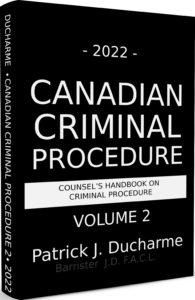 |
| Patrick J Ducharme |
In some cases a trial Judge will allow jurors to take notes during the testimony. The trial Judge will usually allow jurors to take notes provided the trial Judge is convinced that note taking will not interfere with juror’s ability to listen to and consider all of the evidence. Some trial Judges will also allow, in limited circumstances, jurors to ask questions during the course of the trial. This is, however, an exception to the general rule. Generally, jurors sit and listen quietly and patiently until all the evidence has been heard, closing submissions have been made and they have been instructed by the trial Judge’s “charge” to them as to the law and evidence.
In the Judge’s “charge to the jury” he will generally review some, but not all of the evidence. This is intended to help the jury recall the evidence and understand how it relates to the issues. The jurors are warned that it is only their view of the evidence that is relevant, not the view of either the lawyers or the Judge. They are required to consider all of the evidence, even those parts of the evidence not referred to by the Judge or the lawyers at the end of the case.
The presumption of innocence means that the accused person does not have to testify, present evidence, or, prove anything. If the prosecution fails to prove guilt beyond a reasonable doubt the accused must be found not guilty. In other words, the innocence of the accused remains unless and until the prosecutor satisfies the trier beyond a reasonable doubt that the accused is guilty. The presumption of innocence has been defined as a test requiring proof much closer to absolute certainty than probability.

The above is the an excerpt of Patrick J Ducharme's book, Canadian Criminal Procedure Volume 2, available at Amazon or in bulk through MedicaLegal Publishing along with Criminal Trial Strategies.
Subscribe to Patrick Ducharme's Youtube Channel
